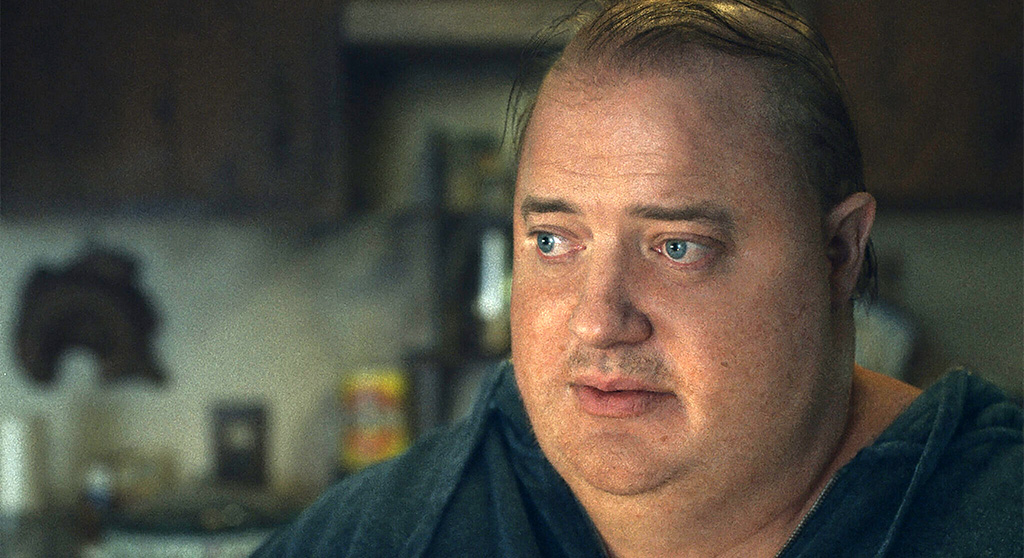‘The Whale’: Isolated and literally heartbroken, Fraser’s character carries weight of stagey drama
![]() Director Darren Aronofsky, a decidedly deft cinematic craftsman, has taken some deep dives into personal torment: “Requiem for a Dream” (2000), “Black Swan” (2010) and “The Wrestler” (2008), to name a few. Here he’s back digging into that all-consuming inner turmoil, but his visual verve – the thing that brings that internalized struggle to the viewer – is missing, emasculated and eradicated by the narrative’s format. Based on Samuel D. Hunter’s 2013 play about a 600-pound recluse struggling with his place in the universe, “The Whale,” as adapted by Hunter and framed by Aronofsky, feels pretty much like a play with the camera perched on the edge of our protagonist’s living room, where nearly all the action takes place. That makes some sense, since Charlie (Brendan Fraser) can’t really get off the couch without the aid of a walker, cane or other hoists.
Director Darren Aronofsky, a decidedly deft cinematic craftsman, has taken some deep dives into personal torment: “Requiem for a Dream” (2000), “Black Swan” (2010) and “The Wrestler” (2008), to name a few. Here he’s back digging into that all-consuming inner turmoil, but his visual verve – the thing that brings that internalized struggle to the viewer – is missing, emasculated and eradicated by the narrative’s format. Based on Samuel D. Hunter’s 2013 play about a 600-pound recluse struggling with his place in the universe, “The Whale,” as adapted by Hunter and framed by Aronofsky, feels pretty much like a play with the camera perched on the edge of our protagonist’s living room, where nearly all the action takes place. That makes some sense, since Charlie (Brendan Fraser) can’t really get off the couch without the aid of a walker, cane or other hoists.
It’s a game go by Fraser, who put on weight for the part (with the final 300 pounds coming from the obvious use of prosthetics) and was last seen with ample heft as a baby-faced gangster in Steven Soderbergh’s “No Sudden Move” (2021). Much is asked of Fraser in “The Whale,” and he responds convincingly, conveying a troubled yet compassionate soul with more than his share of emotional vulnerability. Charles teaches an online writing class (never using his camera for the video sessions), pushing students writing essays to really dig down and say something from within, not just check the boxes of an assignment. Visiting Charles frequently are his estranged daughter (Sadie Sink, enjoyably nasty, if only two-dimensionally so), his nurse (Hong Chau, last seen being far less compassionate in “The Menu”) and a young religious missionary seeking a soul to redeem (Ty Simpkins). Along the way we learn the reason for his daughter’s vindictive state: Charles abandoned the family for another man, and because that didn’t go so well (the details are never fully explained), Charles fell into a deep depression, with food as his only solace. We’re also told by his nurse that Charles’ blood pressure is through the roof and that he’s suffering mini heart attacks at regular intervals but won’t go to the hospital – another nagging snag to the plot.
The title of the film (in theory) is not a reflection of Charlie’s appearance, but a reference to a cherished essay about “Moby Dick.” This dicey fine line has sparked some backlash, and perhaps deservedly so, if not for the title then perhaps for scenes of consumption as Charles folds a whole pepperoni pizza in half and snarfs it down in fast, carnivorous chomps, or his nurse enabling him by bringing him meatball subs that he eats off the crest of his chest. The scenes are nearly as look-away worthy as those in “Bones and All.” Still, there’s palpable love for Charles and his quest for redemption, and all the threads do converge emotionally in the end, even though it feels somewhat manufactured. And that’s another changeup from Aronofsky – clean clarity, not provocative chaos (as in his 2017 film “Mother!”). The bland, matted cinematography takes some zip off, but Fraser, clearly committed, carries much, and the supporting cast do their part.
- “The Whale” is at the Somerville Theatre, 55 Davis Square and AMC Assembly Row 12, 395 Artisan Way, Assembly Square, Somerville.
Cambridge writer Tom Meek’s reviews, essays, short stories and articles have appeared in WBUR’s The ARTery, The Boston Phoenix, The Boston Globe, The Rumpus, The Charleston City Paper and SLAB literary journal. Tom is also a member of the Boston Society of Film Critics and rides his bike everywhere.


